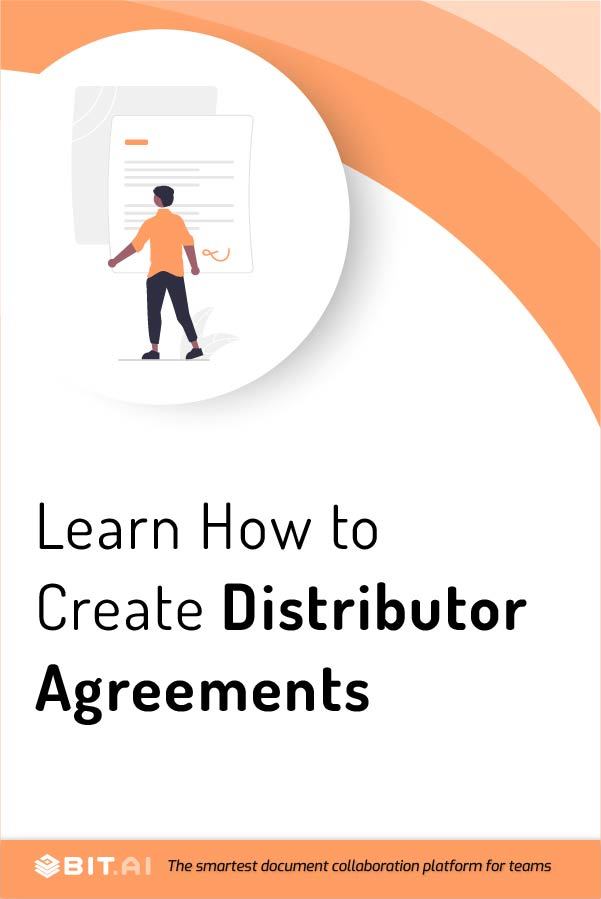If you look at how a restaurant kitchen functions, you will see many busy chefs prepping, cooking, and plating up dishes. You will also see waiters waiting to serve the dishes to the customers.
Now imagine if the waiters did not exist and the chefs had to do all the cooking and serving. That would be a lot of pressure on the chefs. So in this case, the waiters are extremely crucial for the functioning of a restaurant.
This is similar to how a distributor works as well. Their role is first to buy the goods from the supplier and then market and sell the goods. Without them, most suppliers and manufacturers would struggle to get their goods sold.
But to do this, the organization or supplier of the product has to come into a legal agreement with the distributor. This is because mere verbal agreements aren’t enough between the suppliers and the distributors as it often leads to conflicts and misunderstandings that can later lead to legal problems.
Therefore, a distributor agreement is a very easy solution to prevent these misunderstandings and ensure that both parties have absolute clarity in what they need from each other.
Now, if you’re looking to learn more about distributor agreements and how to write them? Then this blog is the perfect place for you! So without much ado, let’s get started!
What is a Distributor Agreement?
A distributor or distribution agreement is an agreement between a manufacturer or supplier of goods and an independent distributor.
The role of a distributor is first to buy the goods from the supplier and then market and sell the goods in their name to customers within certain geographical areas. So, the responsibility of paying for the cost of sales falls on the distributor rather than the manufacturer of the goods.
The distributor agreement defines the product that is required to be sold and the sales targets of the distributor. Along with this the distributor agreement also lays down the conditions and rules under which the distribution will be executed.
 A good distribution agreement helps companies expand their business and gain new territories to market them. And you have the liberty to lay down the rules and sales targets on your own through the distributor agreement and find the right distributor for the product.
A good distribution agreement helps companies expand their business and gain new territories to market them. And you have the liberty to lay down the rules and sales targets on your own through the distributor agreement and find the right distributor for the product.
Having the right distributor agreement can be a win-win situation for the distributor and the supplier. Now let’s take a look at the benefits that a well-thought-out distributor agreement can offer you.
What is The Importance of Creating a Distributor Agreement?
1. Clarity of Goals
One of the most basic components of a distributor agreement is the sales target given to the distributor. By deciding on a prior set sales target you have the luxury of knowing that the distributor will do his best to sell your product and reach the target that you have set for them. It gives you legal assurance of the amount of profit that you will get with the distributor which will go a long way in gaining success.
2. Less Risky
When you give your products to a distributor you dissociate yourself with most of the risks of the business. It becomes the responsibility of the distributor to sell that product. A good distributor agreement covers this aspect and takes away your headache.
The agreement also safeguards from any conflict that may arise in the future as it lays down clear terms and conditions between you and the supplier, and realistically eliminates conflict that might arise in the future as most of them are discussed beforehand in the agreement itself.
3. Business Expansion
With a good distribution agreement, you can get distributors in regions and territories that you could not get on your own. This means that your product can reach markets and customers across the country and the world. Creating this link of networks and distributors for your business can only be possible if you have the right Distributor agreement because distributors mostly decide on taking up these products based on the conditions that are given in the agreement.
Having now understood how a distributor agreement can help you take your business to the next level, let us now understand what it comprises and how we can create the perfect one!
What to Include in a Distributor Agreement?
1. Terms and Conditions of Sale
The basic terms and conditions of sale are the first and foremost part of a distributor agreement. This section enlists the details about various aspects of the business cycle like storage and transportation, payment cycles, and sales procedures. Both, the distributor and the supplier, have to formulate these terms and conditions together and agree upon them.
Since the job of the distributor is to only sell the products provided by the supplier they must have enough details about the product, its viability, and the manufacturing process so that they can use it to market it accordingly and reach their sales targets.
Read More: Sales Contract (Agreement of Sales): What is it & How to Create One?
2. Term of The Agreement
The distributor agreement also consists of the number of years that the two parties will work with each other. It grants a set number of years, agreed upon by the supplier and the distributor, that they will work together along with the condition and options of renewing the contract after the set number of years.
This section ensures that the two parties avoid any legal trouble if either of them is not happy or satisfied with each other. It also brings in a sense of responsibility and long-term planning as they know that they will be working together for a fixed period.
3. Marketing Rights
Marketing rights are also a very essential part of the distributor agreement. This section of the agreement focuses on facilitating the distributor to carry out the required marketing activities for the sales of the product.
 Marketing facilitates increasing the sales of the product and thus should be taken care of in the agreement. The supplier should ensure that the distributor has the privilege of marketing the product in the way they want but it should also have the manufacturer as the bona fide representative.
Marketing facilitates increasing the sales of the product and thus should be taken care of in the agreement. The supplier should ensure that the distributor has the privilege of marketing the product in the way they want but it should also have the manufacturer as the bona fide representative.
4. Trademark Licensing
The distributor should use trademarks as well as the other intellectual properties of the supplier/manufacturer for their everyday operations. It is also used in product advertising and should thus be taken care of in the agreement.
A proper framework should be made in the distributor agreement for the proper usage of the trademarks by the respective distributor. This protects both parties from any conflict and also ensures that the supplier gets all the credit for the product and protects the distributor if any liabilities are found in the product.
5. Geographical Territory
The geographical territory for the distributors’ agreement is the geographical area or location within which the distributor will be able to sell the products given by the manufacturer/supplier.
The agreement binds the distributor within an agreed-upon area where they can sell the product. This is a crucial part of the agreement as it allows the supplier to have more distributors in various areas and thus will not depend on one distributor for their sales.
This also gives security to the distributor as they have the legal assurance of being the only sellers of the given area and therefore earn all the profits from their customers in that area.
6. Performance
In today’s times, businesses are run on the concept of performance. Perform or perish is the mantra that most businesses go by and this must be well-documented in the distributor’s agreement as well.
The distributor agreement must include the sales targets that the distributor has to achieve in the given period. This sales target has to be well thought out and agreed upon by both parties.
The agreement should also have a clause for what happens in case the sales targets are not met by the distributor. This could either mean immediate termination of the contract or some warning and penalization on the distributor. This is purely based on the agreement of both parties and acts as a fail-safe in case the inevitable happens.
7. Pricing
Pricing is the most important component of any product. The right pricing for your product can ensure that you get the best buyers and expand your reach. Therefore having the right pricing of your product in the distributor agreement becomes a vital part of the agreement.
Mostly, it is the distributor who leads the way in deciding the average pricing of the product, but the supplier is by no means a sitting duck in this conversation and has a say in it as well.
The pricing should be flexible and be allowed to change with the change in the market. The maximum and minimum price of the product should also be mentioned in the pricing section of the agreement.
8. Termination
Another important thing to be included in the distributor agreement is the terms of termination. Here, the situations or circumstances in which the agreement may be terminated must be mentioned.
A good distributor agreement provides ample options to both parties to terminate the agreement within the contract itself. It must cover several scenarios that may occur in the given time that may lead to the termination of the contract.
This can include either of the parties not being satisfied with the performance of the other, the breaching of the contract, delays, lack of quality of the products, and more. Each and everything should be well detailed and explained in this section of the agreement.
Read More: Contract Termination: What is it & How to Write it?
9. Signature
At the end of the document, there needs to be a space for both parties to sign and wrap up the agreement. So remember to always have a line for signature, name, and title.
 Now that you know what needs to be included in a distributor agreement, we would like to introduce you to an amazing tool that can make writing any type of agreement as easy as a walk in the park.
Now that you know what needs to be included in a distributor agreement, we would like to introduce you to an amazing tool that can make writing any type of agreement as easy as a walk in the park.
Spare a few minutes and with a couple of clicks, you’ll have yourself the perfect distributor agreement in your hands! Don’t believe us? Scroll down and see for yourself!
Bit.ai: Tool for Creating All Types of Agreements
Bit.ai is a cloud-based document creation and collaboration platform, designed exclusively to satisfy all your documentation needs. Yes, that includes your distributor agreement as well!
It will help you create, edit, organize, manage, and share your distributor agreements all under one roof and that too in just a matter of a few minutes!
Too good to be true? Check out these amazing features of Bit and see for yourself!
1. 70+ Stunning Templates
You no longer have to worry about how your distributor agreements should look like because Bit’s 70+ ready-to-use templates are always at your service! Just pick a template you like and customize it however you want. Moreover, it has auto-formatting which means it automatically formats your entire document so that you don’t have to worry about its uniformity.
2. Real-Time Collaboration
Creating a distributor agreement means that you need suggestions and feedback from others in your business, including your distributor. With Bit, you can seamlessly collaborate with your team and work together on the same document, chat privately, make inline comments, co-edit, and do so much more to ensure that you do not miss out on any important clauses to be included in your agreement!
3. Smart Workspaces
Your business might be dealing with multiple distributors or agents at a time. This means you might have to create multiple agreements which might be difficult to manage. But not with Bit around! Why? Because it allows you to create smart workspaces around multiple vendors, agents, distributors, etc., and manage each agreement super efficiently.
4. Interactive Documents
Another great thing about Bit documents is that they are super interactive and support rich integrations! This means that you can add all kinds of media to your vendor agreement, such as excel sheets, charts, graphs and so much more!
5. Smart Editor
When you create a distributor agreement, it needs your full attention because a tiny mistake is all you require to end up in a huge legal battle. That’s why Bit.ai is a great tool as it offers a minimalistic and distraction-free editor.
6. Document Sharing
There are so many ways you can share your distributor agreement with Bit. You can export your document by converting it into Docx, PDF, and other formats or use Bit’s link-sharing option to share your document with anyone you want. Another way is to use the guest access option that allows you to invite your distributors or other guests into your workspace and give them view-only or comment-only access to documents.
All-in-all Bit is a super awesome tool that has all the perfect features for helping you create a perfect distributor agreement or any other document. Just use Bit and make your life easy!
Conclusion
A solid distributor agreement can protect you and your distributor and is, therefore, a win-win situation for both parties.
In this blog, we have provided you with all the necessary steps to take to write the distributor agreement, and to top it all, we have even introduced you to an awesome tool like Bit!
Now, we think it’s fair to say that you are fully equipped to write an excellent distributor agreement and with Bit on your side, you can even have a hassle-free writing experience as well!
Go out there and start writing your agreements now! Good luck!
Further Reads:
Profit Sharing Agreement: What is it & How to Create it?
Vendor Agreement: What is it and How to Create it?
Shareholder’s Agreement: What is it & How to Create it?
Consulting Agreement or Contract: What is it & How to Create it?
Price Skimming: Definition, 3 Types of Phases, Pros & Cons!



